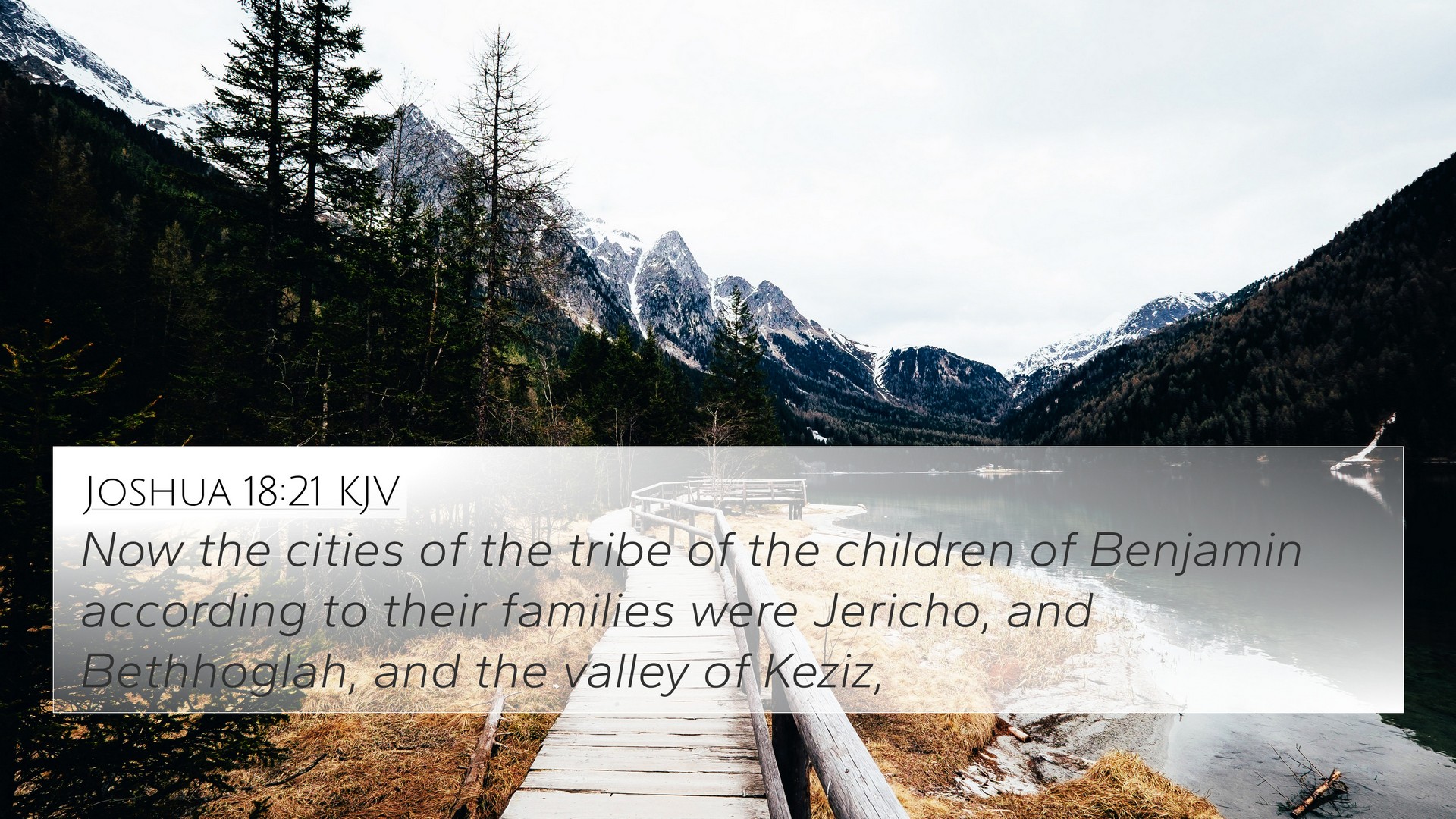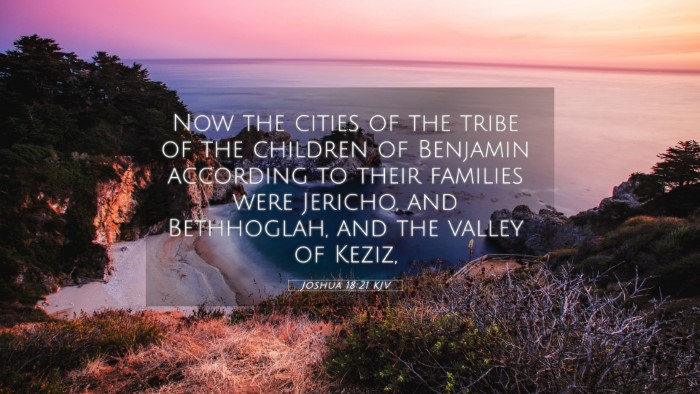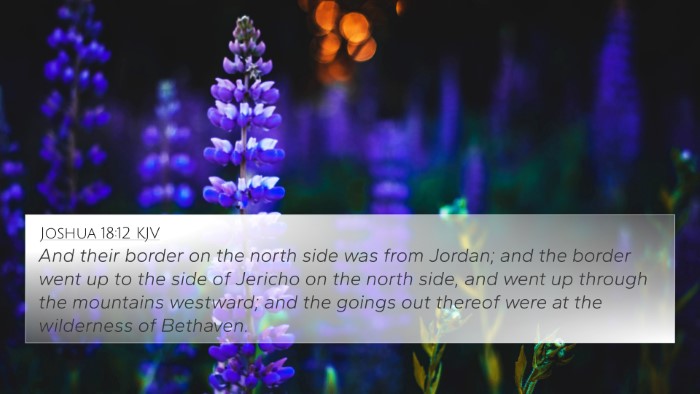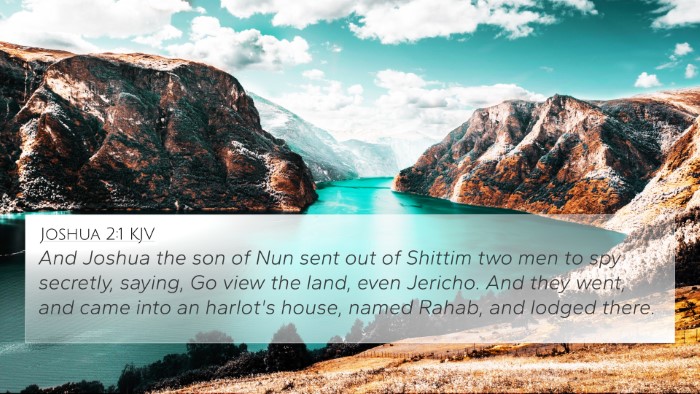Understanding Joshua 18:21
Joshua 18:21 states: "And the cities of the tribe of the children of Benjamin, according to their families, were Jericho, and Bethhaglah, and the valley of Keziz." This verse highlights the allotment of land to the tribe of Benjamin as part of the territorial division undertaken by Joshua in Canaan.
Summary of the Verse
This passage is significant as it reflects the detail with which the Israelites were organized into tribes and families. The mention of specific cities illustrates not only the fulfillment of God's promise to Israel but also the importance of the tribe of Benjamin in the larger context of Israel's history.
Commentary Insights
The commentaries from Matthew Henry, Albert Barnes, and Adam Clarke reveal several themes present in Joshua 18:21. Below are synthesized insights from these respected sources:
-
Historical Context: The cities named represent historical significance as Benjamin's territory included both rural and urban centers, playing a role in the larger narrative of Israel’s conquest and settlement.
-
Thematic Significance: The distribution of land reflects God's promise and providence, illustrating the fulfillment of His covenant. This is a precursor to themes of inheritance found throughout the Scriptures.
-
Covenant Fulfillment: The detailed listing serves as a reminder of God's faithfulness to His people, ensuring that every tribe received its designated inheritance as stipulated in earlier texts.
-
Symbolism of Cities: The cities mentioned are not only geographical locations but serve as symbols of refuge and community for the people of Benjamin, further contributing to the understanding of safety in God's provision.
Bible Verse Cross-References
Understanding Joshua 18:21 can be enhanced by examining its connections within the Bible. Here are some key cross-references:
- Genesis 49:27: References regarding the blessing and future of the tribe of Benjamin.
- Deuteronomy 33:12: Discusses the blessing upon the tribe and their inheritance.
- Joshua 1:6-9: The call for courage in taking possession of the land speaks to the promise fulfilled in Joshua 18.
- Judges 1:21: The struggle for control over the land of Benjamin, linking to their initial settlement.
- 1 Samuel 9:1-2: Introduction of Saul, a Benjamite, emphasizing the importance of this tribe in Israel’s governance.
- Acts 13:21: Reference to Saul, relating the significance of Benjamin in the lineage of Israel's rulers.
- Romans 11:1: Paul’s mention of the tribe highlights its persistence and divine role in Christianity.
Connections Between Bible Verses
The significance of the inheritance allotted to Benjamin and the cities listed in Joshua 18:21 create a rich tapestry that facilitates connections between various scriptures. Below are some insights relating to this verse with others in the Biblical text:
-
New Testament Links: The use of the term "city" in the New Testament, particularly in verses referring to Jerusalem, provides parallels that underscore Benjamin’s role in the Israelite kingdom.
-
Map of Israelite Tribes: Comparative studies examining all twelve tribes, analyzing their designated areas which were allotted is crucial for understanding the social fabric of ancient Israel.
-
Prophetic Letters: Influences of the prophets concerning the tribes and their responsibilities, particularly in relation to the coming Messiah found in the lineage of David.
Tools for Bible Cross-Referencing
Understanding these connections can be enhanced through various tools and resources:
- Bible concordance for identifying specific references and themes.
- Bible cross-reference guide: This can assist in locating similar themes across different books.
- Cross-reference Bible study: Utilizing materials designed to facilitate deeper study.
- Comprehensive Bible cross-reference materials: Important for sermon preparation and thematic analysis.
Conclusion
Joshua 18:21 is not just a historical reference; it is a pivotal verse that illustrates the organization of God's people, the fulfillment of His promises, and the significance of the tribe of Benjamin in both Old and New Testament contexts. By studying its connections through cross-referencing Biblical texts, one can gain a deeper understanding of the overarching narrative of God's covenant with Israel and His ongoing relation to His people.
Engaging in comparative Bible verse analysis helps believers understand the flow of God's plan throughout history and highlights the intentionality behind His design for His people.









